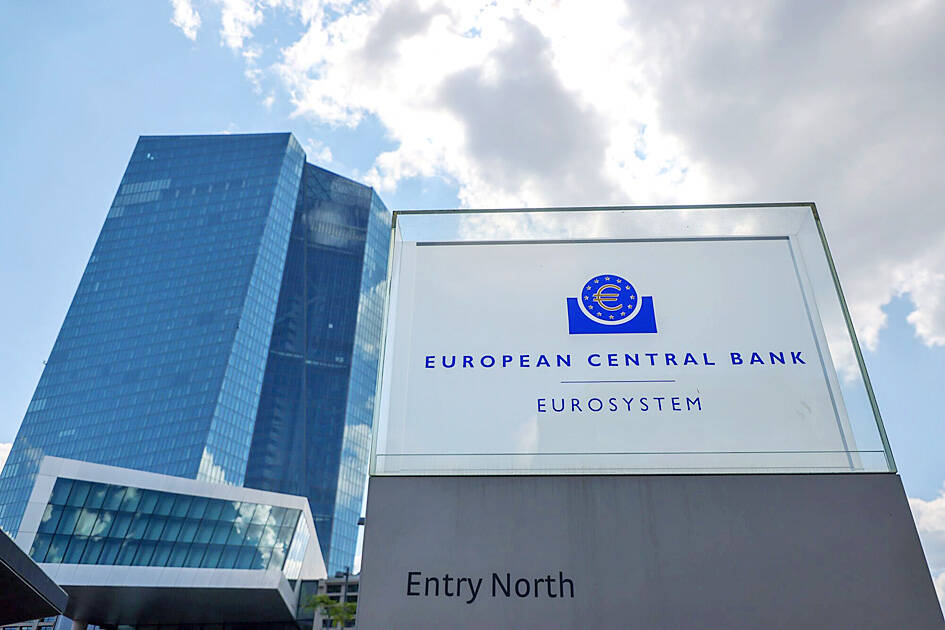The European Central Bank (ECB) yesterday raised interest rates for the eighth successive time and signaled more policy tightening, as it battles high inflation.
The ECB has increased borrowing costs by a combined 4 percentage points in a year, its fastest pace on record, but a peak is in sight and the debate is slowly shifting to how long rates would need to be kept at current levels.
“The [ECB] Governing Council’s future decisions will ensure that the key ECB interest rates will be brought to levels sufficiently restrictive to achieve a timely return of inflation to the 2 percent medium-term target,” the ECB said after lifting the deposit rate by 25 basis points to a 22-year high of 3.5 percent.

Photo: Bloomberg
Policymakers need to reconcile opposing forces.
At 6.1 percent, inflation is already below double-digit readings from autumn last year, and a recession — along with sharply lower commodity prices — would cool price growth quickly over the rest of the year.
However, the labor market remains tight, nominal wage growth is quick and underlying price pressures, particularly for services, appear to be stubbornly high.
Therefore, many policymakers have already put a rate hike on the table for next month, with nearly all saying they were keeping an open mind about September.
“Staff have revised up their projections for inflation excluding energy and food, especially for this year and next year, owing to past upward surprises and the implications of the robust labor market for the speed of disinflation,” the ECB added.
Complicating the decision, the US Federal Reserve paused its rate hikes on Wednesday after 10 straight increases, signaling that a global tightening cycle could soon come to an end, even if a little more tightening is still possible.
Prior to yesterday’s decision, markets had priced in another 25 basis point ECB rate hike next month or in September, and there is a moderate chance of another move later this year, perhaps in September or October.
The ECB also announced to end reinvestments in its 3.2 trillion euro [US$3.5 trillion] Asset Purchase Program from next month, a widely expected and long-flagged decision that would catch no investor off-guard.

Semiconductor business between Taiwan and the US is a “win-win” model for both sides given the high level of complementarity, the government said yesterday responding to tariff threats from US President Donald Trump. Home to the world’s largest contract chipmaker, Taiwan Semiconductor Manufacturing Co (TSMC, 台積電), Taiwan is a key link in the global technology supply chain for companies such as Apple Inc and Nvidia Corp. Trump said on Monday he plans to impose tariffs on imported chips, pharmaceuticals and steel in an effort to get the producers to make them in the US. “Taiwan and the US semiconductor and other technology industries

SMALL AND EFFICIENT: The Chinese AI app’s initial success has spurred worries in the US that its tech giants’ massive AI spending needs re-evaluation, a market strategist said Chinese artificial intelligence (AI) start-up DeepSeek’s (深度求索) eponymous AI assistant rocketed to the top of Apple Inc’s iPhone download charts, stirring doubts in Silicon Valley about the strength of the US’ technological dominance. The app’s underlying AI model is widely seen as competitive with OpenAI and Meta Platforms Inc’s latest. Its claim that it cost much less to train and develop triggered share moves across Asia’s supply chain. Chinese tech firms linked to DeepSeek, such as Iflytek Co (科大訊飛), surged yesterday, while chipmaking tool makers like Advantest Corp slumped on the potential threat to demand for Nvidia Corp’s AI accelerators. US stock

The US Federal Reserve is expected to announce a pause in rate cuts on Wednesday, as policymakers look to continue tackling inflation under close and vocal scrutiny from US President Donald Trump. The Fed cut its key lending rate by a full percentage point in the final four months of last year and indicated it would move more cautiously going forward amid an uptick in inflation away from its long-term target of 2 percent. “I think they will do nothing, and I think they should do nothing,” Federal Reserve Bank of St Louis former president Jim Bullard said. “I think the

Cryptocurrencies gave a lukewarm reception to US President Donald Trump’s first policy moves on digital assets, notching small gains after he commissioned a report on regulation and a crypto reserve. Bitcoin has been broadly steady since Trump took office on Monday and was trading at about US$105,000 yesterday as some of the euphoria around a hoped-for revolution in cryptocurrency regulation ebbed. Smaller cryptocurrency ether has likewise had a fairly steady week, although was up 5 percent in the Asia day to US$3,420. Bitcoin had been one of the most spectacular “Trump trades” in financial markets, gaining 50 percent to break above US$100,000 and